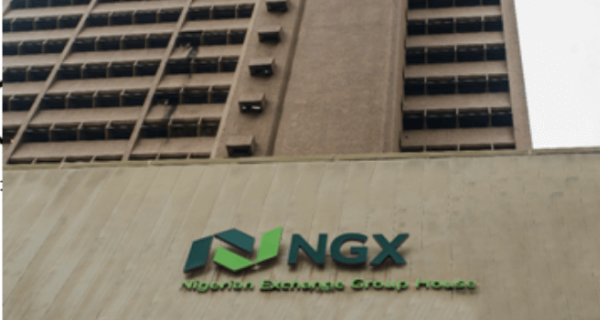E-Financial
NGX Group Upholds Global Best Practices Ahead of Planned Listing by Introduction

In line with its commitment to uphold best global practices, Nigerian Exchange Group Plc’s (NGX Group or The Group) leveraged the Facts Behind the Listing of (NGX or The Exchange) to engage stakeholders ahead of the Listing by Introduction of its shares on NGX.

The proposed listing, the NGX said in a statement, comes on the back of the successful completion of the demutualisation and restructuring of the former Nigerian Stock Exchange and its related operations within NGX Group.
“Furthermore, In line with the practice of demutualized exchanges, NGX Group will be listing on the operating Exchange to support liquidity and enhance transparency.
The proposed listing of the shares of NGX Group is expected to occur following the fulfillment of all regulatory requirements and the approval of NGX Regulation Limited. A total of 1,964,115,918 shares are expected to be admitted to trading and the shares will trade under the ticker NGXGROUP. “it stated.
Speaking during the Facts Behind the Listing, the Chief Executive Officer, NGX, Mr. Temi Popoola, noted that, “I am pleased to congratulate the Board, Management and staff of NGX Group for the successful completion of the demutualization and restructuring of the former Nigerian Stock Exchange and subsequent listing on the Main Board of NGX.
“Demutualization strategically places NGX Group in a position to provide liquidity to members while stimulating the capital market ecosystem to grow at the same pace as the economy.
“Furthermore, this move will see The Exchange evolve in a fashion similar to other demutualized exchanges, which have experienced significant periods of growth following their demutualization.”
On his part, Mr. Oscar N. Onyema, the Group Managing Director/Chief Executive Officer, NGX Group, during his presentation highlighted that, “NGX Group has its key strategic focus geared at leveraging organic and inorganic growth opportunities for expansion of its business across relevant business categories in order to increase global competitiveness.
“As a listed entity, NGX Group will have access to the widest range of new investors, including the growing pool of institutional investors, and this is just on one more step in our evolution. Having successfully demutualised, we will actively forge ahead with its aspiration to become Africa’s leading integrated capital market infrastructure group.”
Speaking to the prospects NGX Group provides to investors, the Group Chief Financial Officer, NGX Group, Mr. Cyril Eigbobo presented the financial of the organisation in its pre-demutualised state. “NGX Group boasts a diversified revenue base with significant contributions from transaction fees, listing fees, interest income from investment in treasury bills, fixed deposit etc.
In addition to contributions from operating subsidiaries, consolidated Group net income includes share of income in equity investees held by the Holdco, NGX Group Plc. Evidently, The Group has a large, diversified and growing asset base which includes long and short-term risk-free securities.”
Otunba Abimbola Ogunbanjo, Group Chairman, NGX Group, had also earlier stated, “The Group expects the Listing to bring significant benefits to its business and its stakeholders. NGX Group will enhance its strategic flexibility by creating new financing opportunities and partnership possibilities, while diversifying its shareholder base.
“This milestone will open up The Group’s capital to new investors within the Nigerian investing public as well as international institutions thereby reinforcing NGX Group’s presence in international capital markets, and for its current long-term shareholders, it will create the possibility to realise value.”
E-Financial
NDIC Says No Customer Loses Deposits in Failed Banks

Nigeria Insurance Deposit Corporation (NDIC) has guaranteed customers of insured commercial banks prompt recovery of their deposits in the event of risk liability or liquidation.

In addition, the corporation assured depositors of its statutory mandate, which includes supervising banks for risk assessment, ensuring ethical standards, and enhancing financial stability in the country.
Mrs Emily Osuji, executive director, Corporate Services, NDIC, gave the assurance during a Stakeholders Town Hall Meeting on customer protection regarding bank charges and deposits in Kano.
Mrs Osuji posited that the NDIC has, in recent times, demonstrated a strong commitment to protecting the hard-earned savings of Nigerians and sustaining confidence in the banking system.
She cited the cases of defunct Heritage Bank Limited, Union Homes Plc and Aso Savings and Loans Plc, where depositors received their deposits promptly after meeting the relevant requirements.
The NDIC boss, however, reminded customers to link their Bank Verification Number (BVN) as a unique identifier to locate their alternate accounts, where their claims will be transferred.
The executive director affirmed that NDIC has expanded coverage to protect about 99 per cent of depositors in Nigeria, a deliberate policy aimed at protecting small savers, promoting financial inclusion, and enhancing trust in the banking sector.
She said, “The corporation fulfils its role through its core mandates of deposit guarantee, bank supervision, distress resolution and bank liquidation, all of which are geared towards protecting the hard-earned savings of Nigerians and sustaining confidence in the banking system.
“Our strapline, ‘Protecting your bank deposits!’, is more than mere words for us. We stand by this statement as a firm commitment to our mandate of ensuring that depositors have access to their hard-earned savings in the event of bank failure.
“This is a critical responsibility that we do not take lightly. This is especially so in times of financial uncertainty and distress, with the NDIC standing as a pillar of safety and reassurance for depositors, particularly the most vulnerable.”
Speaking on the concept of stakeholder engagement, Hawwau Gambo, head of Communication and Public Affairs, said the corporation was compelled to provide clarity, build trust and strengthen depositor confidence amid misconceptions.
Gambo noted that the recent revocation of the operating licences of some banks by the Central Bank of Nigeria, (CBN) and the current public discourse on banks’ recapitalisation efforts have reinforced the need for sustained stakeholder engagement.
She reminded that sustained awareness is pertinent to dust, given already heightened public interest and featured public confidence in the financial institutions.
“NDIC’s last Public Awareness Survey highlighted the need to enhance interpersonal communication channels to improve public understanding of deposit insurance. It is against this backdrop that the Stakeholders’ Town Hall Meetings were conceived as a structured, interactive platform for dialogue, education and feedback,” Gambo noted.
E-Financial
CBN Expresses Concern Over Foreign Investments in Nigeria Fintechs

The Central Bank of Nigeria in its 2025 Fintech Policy Insight Report, has raised concern over Nigeria’s fintech sector heavily dependent on foreign investment, exposing it to swings in global markets.

The report said the sector has shown resilience despite global economic pressures, but warned that reliance on external capital leaves it vulnerable to market fluctuations.
It would be recalled that startups in the country raised $520m in equity funding in 2024, down from about $747m in 2019, when Nigeria captured roughly 37 per cent of all African startup investment.
This performance, amid significant global macroeconomic gyrations, underscores Nigeria’s position as a key hub for financial innovation. The sharp rise in interest rates in advanced economies during 2022 contributed to a slowdown in venture capital funding.
“These dynamics highlight the importance of developing domestic funding avenues, such as leveraging Nigeria’s capital markets, to reduce currency risk and sustain fintech growth,” the apex bank stated.
Olayemi Cardoso, CBN Governor, said Nigeria is undergoing a rapid and significant financial evolution. Over the past decade, the nation’s fintech landscape has grown from a handful of startups into one of Africa’s most vibrant innovation ecosystems.
“Even amid global economic headwinds, Nigerian fintech firms continued to attract investment and drive change. Today, with improved stability of our currency and domestic economy, it is clearer than ever that financial innovation can advance inclusion at scale,” the executive commented on the report.
In addition to funding, the central bank underscored Nigeria’s continued leadership in digital financial infrastructure. More than 25 per cent of all electronic transactions in Africa’s most populous nation are processed via real-time payment channels, with close to 11 billion transactions processed in 2024, up from five billion in 2022. The report described Nigeria’s instant payments platform, NIBSS NIP, as among the most mature and widely adopted globally.
The report also mentioned the need to strengthen system integrity and reputation, pointing to compliance reforms, anti-money laundering supervision, and consumer protection measures as key priorities for sustaining investor confidence.
By focusing on domestic funding, regulatory modernisation, and innovation infrastructure, the CBN aims to position Nigeria not only as a fintech front-runner but also as a rule-setter whose regulatory lessons are relevant to peer emerging and high-growth economies globally, the central bank said.
Stakeholders surveyed by the CBN also cited compliance costs as a significant challenge to innovation. According to the report, 87.5 per cent of respondents said that the cost of meeting regulatory and risk requirements significantly impacts their capacity to innovate, while delays in product approvals and regulatory timelines also remain major bottlenecks.
The report noted that 62.5 per cent of fintech firms plan to expand regionally, and there is strong support for regulatory pass-porting frameworks to enable compliant expansion into other African markets. However, the CBN warns that such cross-border growth requires a stable funding base and coordinated regulation.
E-Financial
UBA’s Easy and Instant Account Opening Thrills Returnee

After a few years abroad, I returned to Nigeria and faced a dilemma. Let me tell you all about it.

UBA
A few days ago, I was dragging my luggage through Murtala Muhammed International Airport. Everything felt bright and beautiful. Not necessarily in aesthetics, but in the vibrant colours, sounds, and energy all around. After three intensive years in the UK, I was finally back home. Ready for the hustle and bustle of Lagos life, and yes, the comfort of my parents’ home.
The plan was simple. Settle down and get my life on track. I’d sorted the job, and I had my person. But then came my dilemma. Money!. This doesn’t mean I was short of it or had too much of it. The real issue is where to actually keep and manage it in this country with daily dramatic happenings. With just two weeks left before I resumed at my new workplace, I had no time for long queues, endless paperwork, or the classic “Nigeria bank stress.” So, I needed an account, and I needed it fast.
So I turned to my best friend, Google, and typed, “Instant account opening in Nigeria.”
In less than a second, I was redirected to the United Bank for Africa instant account opening portal. A few taps later, and I had a fully functional account. Just like that. I could receive my funds, transfer my funds, and start building my financial life here again.
In less than a second, I was redirected to the United Bank for Africa instant account opening portal. A few taps later, and I had a fully functional account. Just like that. I could receive my funds, transfer my funds, and start building my financial life here again. Talk about ease, and this beautiful experience truly exemplified that definition
I was genuinely amazed. It felt too easy, almost suspiciously easy. But it was real, I mean, really soft like they were just thinking all about me while developing this new feature.
If you’re like me and pressed for time, avoiding unnecessary stress, or just ready to sort your finances without the hassle, consider this your sign.
UBA’s instant account opening is a game-changer. No queues to cut into your precious time. Just you and your phone, minutes away from being banked.
Get started here: https://aop.ubagroup.com
Trust me, if I could do it between unpacking and settling in, you can do it too. Your future self will thank you.

 Telecom3 days ago
Telecom3 days agoNCC Committed to Regional Digital Integration – Maida

 General News3 days ago
General News3 days agoIndigenous Firm Deploys 400,000 Smart Electricity Meters in 2025

 E-Financial3 days ago
E-Financial3 days agoCBN Expresses Concern Over Foreign Investments in Nigeria Fintechs

 E-Financial3 days ago
E-Financial3 days agoBOI Secures CBN Nod for Sharia Banking, Unlocks Ethical Funding Boom

 Telecom3 days ago
Telecom3 days agoITU Top Director Visits NITDA, Boosts Nigeria’s Digital Literacy Push

 E-Financial3 days ago
E-Financial3 days agoUBA’s Easy and Instant Account Opening Thrills Returnee

 News3 days ago
News3 days agoEFInA Unveils Research Fellowship Programme to Deepen Financial Inclusion Impact

 General News2 days ago
General News2 days agoCBN, NCC Propose Instant Refunds for Failed Airtime, Data



























